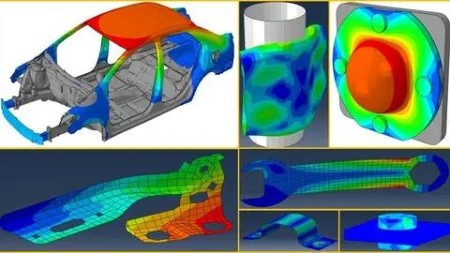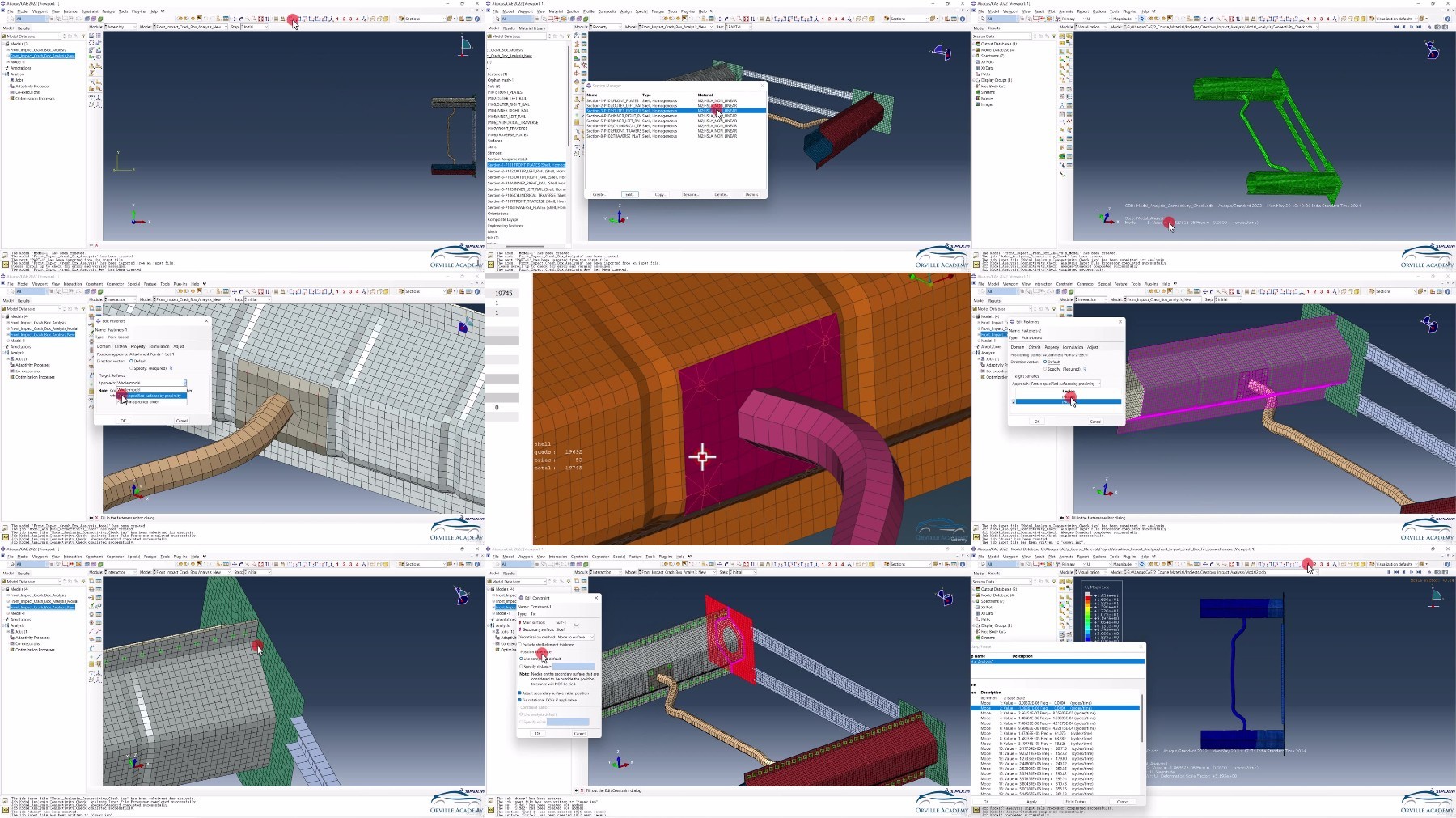Most Commented
Abaqus Cae: A Detailed Introduction To Structural Analysis




Description material

Abaqus Cae: A Detailed Introduction To Structural Analysis
Published 4/2024
MP4 | Video: h264, 1920x1080 | Audio: AAC, 44.1 KHz
Language: English | Size: 10.07 GB | Duration: 15h 33m
Comprehensive course on static and dynamic analysis using Abaqus CAE with more than 5 industry oriented projects
What you'll learn
Prepare entire model setup in Abaqus CAE
Independently perform static and dynamic analysis
Co-relation of CAE results with manual calculations
Review of results given by CAE software
Linear and Non-Linear Analysis
Perform different types of analysis on 1D, 2D and 3D elements
Requirements
Should be eager to learn and explore different options and possibilities within CAE
No prerequisite required in terms of formal education.
Description
Course Overall Theme Hello Everyone, I welcome you all to the new course on Abaqus CAE in our orville academy's library.Center focus of the course is to make you familiar with static and dynamic analysis. Course Start with introduction to theoretical concepts which we need during the course, so even if you are beginner and don't know from where to start, well this course is perfect place for you. Course has been divided to into multiple sections which covers everything that you need to know to start working or execute project independently. Wherever possible, More attention was given to verifying the CAE solution with manual calculations. Various tips, tricks and industry insights are given during the course so user can align themselves with how people working in organization think or do things.Course Structure Below is the detailed outline of the various topics covered in the course.Section 1 : Theory of CAE/FEAProduct Lifecycle ManagementDegree of FreedomMethods to Solve Engineering ProblemIntuition of CAE Software's/ToolsCAE and it's DomainsSteps in FEAFEA and Interpolation FunctionTypes of Numerical MethodsTypes of ElementsLinear vs Non-Linear & Steady vs TransientTypes of Structural AnalysisImplicit vs Explicit Schemes in FEASection 2 : Introduction to ABAQUS CAEOverview and Launching ABAQUS CAEGraphical User Interface (GUI)Interacting with ModelUnderstanding Overall Procedure : Model Setup, Solution and Visualization1D Analysis Setup : Cantilever BeamTypical Procedure : 2D ElementTypical Procedure : 3D ElementRevision : Analysis Setups 1D, 2D and 3DSection 3 : Geometry CreationSketcher Options : Part-1 ,2,3Sketcher Exercise : 1Sketcher Exercise : 2Sketcher Task : 1Sketcher Task : 2Creating Datum Features : Points, Axis, Plane and SYSSection 4 : Linear Static Structural AnalysisOverviewMesh Convergence : Part-1,2Mesh Convergence : ExerciseExample : Pressure Load on U Shaped BracketTips & Tricks : Saving Display SettingsExample : Beam BracketSection 5 : File Structure and Dictating Abaqus JobsInput File.dat File.msg File.sta and Remaining FilesOutput Formats in AbaqusPerforming Multistep AnalysisSection 6 : Buckling AnalysisIntroduction to Buckling AnalysisCases of Column Buckling FailureExample Case 1 : Fixed - Free EndExample Case 2 : Pinned - Pinned EndExample Case 3 and Case 4 : Fixed - Pinned, Fixed-Fixed EndExample : Mobile Tower BucklingExample : Spring BucklingSection 7 : Non-Linear AnalysisIntroduction to Non Linear AnalysisControlling Non-Linear AnalysisConcept of Step, Increment and IterationsTypes of Geometric Non LinearitiesExample : Geometric Non-LinearityExample : Stress StiffeningTheory : Material Non-LinearityExample : Material Non -LinearitySection 8 : Modal AnalysisTypes of Dynamic AnalysisOverview of Modal Analysis and It's ImportanceGoverning Equation : Modal AnalysisExample : Understanding Rigid Body Modes Part-1,2Understanding Mechanism ModesAvoiding Resonance : Example PlateMode Participation Factor and Effective MassExample Pre-Stress Modal Analysis : Plane WingSection 9 : DampingTheory : DampingExample : Spring Dashpot DampingSection 10 : Harmonic AnalysisTheory of Harmonic AnalysisExample - 1 : Fixed Fixed Beam Part - 1Example - 1 : L Shaped BracketExample - 3 : GuitarSection 11: Explicit AnalysisImplicit vs Explicit Methods/Schemes/AnalysisConcept of Timestep : Part - 1,2
Overview
Section 1: Theory of CAE/FEA
Lecture 1 Product Lifecycle Management
Lecture 2 Degree of Freedom
Lecture 3 Methods to Solve Engineering Problem
Lecture 4 Intuition of CAE Software's/Tools
Lecture 5 CAE and it's Domains
Lecture 6 Steps in FEA
Lecture 7 FEA and Interpolation Function
Lecture 8 Types of Numerical Methods
Lecture 9 Types of Elements
Lecture 10 Linear vs Non-Linear & Steady vs Transient
Lecture 11 Types of Structural Analysis
Lecture 12 Implicit vs Explicit Schemes in FEA
Section 2: Introduction to ABAQUS CAE
Lecture 13 Overview and Launching ABAQUS CAE
Lecture 14 Graphical User Interface (GUI)
Lecture 15 Interacting with Model
Lecture 16 Understanding Overall Procedure : Model Setup, Solution and Visualization
Lecture 17 1D Analysis Setup : Cantilever Beam
Lecture 18 Typical Procedure : 2D Element
Lecture 19 Typical Procedure : 3D Element
Lecture 20 Revision : Analysis Setups 1D, 2D and 3D
Section 3: Geometry Creation
Lecture 21 Sketcher Options : Part-1
Lecture 22 Sketcher Options : Part-2
Lecture 23 Sketcher Options : Part-3
Lecture 24 Sketcher Exercise : 1
Lecture 25 Sketcher Exercise : 2
Lecture 26 Creating Shapes : Part - 1
Lecture 27 Creating Shapes : Part - 2
Lecture 28 Creating Datum Features : Points, Axis, Plane and SYS
Section 4: Linear Static Structural Analysis
Lecture 29 Overview
Lecture 30 Mesh Convergence : Part-1
Lecture 31 Mesh Convergence : Part-2
Lecture 32 Mesh Convergence : Exercise
Lecture 33 Example : Pressure Load on U Shaped Bracket
Lecture 34 Tips & Tricks : Saving Display Settings
Lecture 35 Example : Beam Bracket
Section 5: File Structure and Dictating Abaqus Jobs
Lecture 36 Input File
Lecture 37 .dat File
Lecture 38 .msg File
Lecture 39 .sta and Remaining Files
Lecture 40 Output Formats in Abaqus
Section 6: Buckling Analysis
Lecture 41 Introduction to Buckling Analysis
Lecture 42 Cases of Column Buckling Failure
Lecture 43 Example Case 1 : Fixed - Free End
Lecture 44 Example Case 2 : Pinned - Pinned End
Lecture 45 Example Case 3 and Case 4 : Fixed - Pinned, Fixed-Fixed End
Lecture 46 Example : Mobile Tower Buckling
Lecture 47 Example : Spring Buckling
Section 7: Non-Linear Analysis
Lecture 48 Introduction to Non Linear Analysis
Lecture 49 Controlling Non-Linear Analysis
Lecture 50 Concept of Step, Increment and Iterations
Lecture 51 Types of Geometric Non Linearities
Lecture 52 Example : Stress Stiffening Simply Supported Beam
Lecture 53 Example : Geometric Non-Linearity
Lecture 54 Theory : Material Non-Linearity
Lecture 55 Example : Spring Plate
Lecture 56 Introduction To Contacts
Lecture 57 Procedure to Create Typical Contact
Lecture 58 Types of Contacts in ABAQUS
Lecture 59 Example : Contact Analysis Part - 1
Lecture 60 Example : Contact Analysis Part - 2
Section 8: Modal Analysis
Lecture 61 Overview of Modal Analysis and It's Importance
Lecture 62 Governing Equation : Modal Analysis
Lecture 63 Example : Understanding Rigid Body Modes Part-1
Lecture 64 Example : Understanding Rigid Body Modes Part-2
Lecture 65 Understanding Mechanism Modes
Lecture 66 Avoiding Resonance : Example Plate
Lecture 67 Mode Participation Factor and Effective Mass
Lecture 68 Example Pre-Stress Modal Analysis : Plane Wing
Section 9: Damping
Lecture 69 Theory : Damping
Lecture 70 Example : Spring Dashpot Damping
Section 10: Harmonic Analysis
Lecture 71 Theory of Harmonic Analysis
Lecture 72 Example - 1 : Fixed Fixed Beam Part - 1
Lecture 73 Example - 1 : Fixed Fixed Beam Part - 2
Lecture 74 Example - 1 : Fixed Fixed Beam Part - 3
Lecture 75 Example - 2 : L Shaped Bracket
Section 11: Explicit Analysis
Lecture 76 Concept of Timestep : Part - 1
Lecture 77 Concept of Timestep : Part - 2
Lecture 78 Example : Wave Propagation in BAR
Lecture 79 Effect of Mesh on Stable Time Increment
Mechanical, Automobile and Aerospace Engineers,Anyone who wants to get into CAE or finite element analysis field

https://rapidgator.net/file/3b77fb9ed990fbd8f917b924a95999f1/.Abaqus.CAE.A.Detailed.Introduction.to.Structural.Analysis.2024-6.part1.rar
https://rapidgator.net/file/61371a63eb347996f2a8ca68693d2227/.Abaqus.CAE.A.Detailed.Introduction.to.Structural.Analysis.2024-6.part2.rar
https://rapidgator.net/file/1f4fb5a0d76377d4b6d64e3320aa2c53/.Abaqus.CAE.A.Detailed.Introduction.to.Structural.Analysis.2024-6.part3.rar
https://rapidgator.net/file/37215647e9c157f164f7f1ee6d5654af/.Abaqus.CAE.A.Detailed.Introduction.to.Structural.Analysis.2024-6.part4.rar
https://rapidgator.net/file/f38e2fb7ec39e6002712548f64443ead/.Abaqus.CAE.A.Detailed.Introduction.to.Structural.Analysis.2024-6.part5.rar
https://rapidgator.net/file/8d2328d5e745e9cb7cc4e4826a2ab77a/.Abaqus.CAE.A.Detailed.Introduction.to.Structural.Analysis.2024-6.part6.rar
https://rapidgator.net/file/8a274be9d7a7a4339dad4df03201edd2/.Abaqus.CAE.A.Detailed.Introduction.to.Structural.Analysis.2024-6.part7.rar

https://filestore.me/ug1raa5he1ey/.Abaqus.CAE.A.Detailed.Introduction.to.Structural.Analysis.2024-6.part1.rar
https://filestore.me/phzds695xwyt/.Abaqus.CAE.A.Detailed.Introduction.to.Structural.Analysis.2024-6.part2.rar
https://filestore.me/vmdpa3bjxnor/.Abaqus.CAE.A.Detailed.Introduction.to.Structural.Analysis.2024-6.part3.rar
https://filestore.me/yu5c7y514i5l/.Abaqus.CAE.A.Detailed.Introduction.to.Structural.Analysis.2024-6.part4.rar
https://filestore.me/0ld878md6u6l/.Abaqus.CAE.A.Detailed.Introduction.to.Structural.Analysis.2024-6.part5.rar
https://filestore.me/kbsd3cvqw6we/.Abaqus.CAE.A.Detailed.Introduction.to.Structural.Analysis.2024-6.part6.rar
https://filestore.me/vkz85eqxy3m9/.Abaqus.CAE.A.Detailed.Introduction.to.Structural.Analysis.2024-6.part7.rar
What you'll learn
Prepare entire model setup in Abaqus CAE
Independently perform static and dynamic analysis
Co-relation of CAE results with manual calculations
Review of results given by CAE software
Linear and Non-Linear Analysis
Perform different types of analysis on 1D, 2D and 3D elements
Requirements
Should be eager to learn and explore different options and possibilities within CAE
No prerequisite required in terms of formal education.
Description
Course Overall Theme Hello Everyone, I welcome you all to the new course on Abaqus CAE in our orville academy's library.Center focus of the course is to make you familiar with static and dynamic analysis. Course Start with introduction to theoretical concepts which we need during the course, so even if you are beginner and don't know from where to start, well this course is perfect place for you. Course has been divided to into multiple sections which covers everything that you need to know to start working or execute project independently. Wherever possible, More attention was given to verifying the CAE solution with manual calculations. Various tips, tricks and industry insights are given during the course so user can align themselves with how people working in organization think or do things.Course Structure Below is the detailed outline of the various topics covered in the course.Section 1 : Theory of CAE/FEAProduct Lifecycle ManagementDegree of FreedomMethods to Solve Engineering ProblemIntuition of CAE Software's/ToolsCAE and it's DomainsSteps in FEAFEA and Interpolation FunctionTypes of Numerical MethodsTypes of ElementsLinear vs Non-Linear & Steady vs TransientTypes of Structural AnalysisImplicit vs Explicit Schemes in FEASection 2 : Introduction to ABAQUS CAEOverview and Launching ABAQUS CAEGraphical User Interface (GUI)Interacting with ModelUnderstanding Overall Procedure : Model Setup, Solution and Visualization1D Analysis Setup : Cantilever BeamTypical Procedure : 2D ElementTypical Procedure : 3D ElementRevision : Analysis Setups 1D, 2D and 3DSection 3 : Geometry CreationSketcher Options : Part-1 ,2,3Sketcher Exercise : 1Sketcher Exercise : 2Sketcher Task : 1Sketcher Task : 2Creating Datum Features : Points, Axis, Plane and SYSSection 4 : Linear Static Structural AnalysisOverviewMesh Convergence : Part-1,2Mesh Convergence : ExerciseExample : Pressure Load on U Shaped BracketTips & Tricks : Saving Display SettingsExample : Beam BracketSection 5 : File Structure and Dictating Abaqus JobsInput File.dat File.msg File.sta and Remaining FilesOutput Formats in AbaqusPerforming Multistep AnalysisSection 6 : Buckling AnalysisIntroduction to Buckling AnalysisCases of Column Buckling FailureExample Case 1 : Fixed - Free EndExample Case 2 : Pinned - Pinned EndExample Case 3 and Case 4 : Fixed - Pinned, Fixed-Fixed EndExample : Mobile Tower BucklingExample : Spring BucklingSection 7 : Non-Linear AnalysisIntroduction to Non Linear AnalysisControlling Non-Linear AnalysisConcept of Step, Increment and IterationsTypes of Geometric Non LinearitiesExample : Geometric Non-LinearityExample : Stress StiffeningTheory : Material Non-LinearityExample : Material Non -LinearitySection 8 : Modal AnalysisTypes of Dynamic AnalysisOverview of Modal Analysis and It's ImportanceGoverning Equation : Modal AnalysisExample : Understanding Rigid Body Modes Part-1,2Understanding Mechanism ModesAvoiding Resonance : Example PlateMode Participation Factor and Effective MassExample Pre-Stress Modal Analysis : Plane WingSection 9 : DampingTheory : DampingExample : Spring Dashpot DampingSection 10 : Harmonic AnalysisTheory of Harmonic AnalysisExample - 1 : Fixed Fixed Beam Part - 1Example - 1 : L Shaped BracketExample - 3 : GuitarSection 11: Explicit AnalysisImplicit vs Explicit Methods/Schemes/AnalysisConcept of Timestep : Part - 1,2
Overview
Section 1: Theory of CAE/FEA
Lecture 1 Product Lifecycle Management
Lecture 2 Degree of Freedom
Lecture 3 Methods to Solve Engineering Problem
Lecture 4 Intuition of CAE Software's/Tools
Lecture 5 CAE and it's Domains
Lecture 6 Steps in FEA
Lecture 7 FEA and Interpolation Function
Lecture 8 Types of Numerical Methods
Lecture 9 Types of Elements
Lecture 10 Linear vs Non-Linear & Steady vs Transient
Lecture 11 Types of Structural Analysis
Lecture 12 Implicit vs Explicit Schemes in FEA
Section 2: Introduction to ABAQUS CAE
Lecture 13 Overview and Launching ABAQUS CAE
Lecture 14 Graphical User Interface (GUI)
Lecture 15 Interacting with Model
Lecture 16 Understanding Overall Procedure : Model Setup, Solution and Visualization
Lecture 17 1D Analysis Setup : Cantilever Beam
Lecture 18 Typical Procedure : 2D Element
Lecture 19 Typical Procedure : 3D Element
Lecture 20 Revision : Analysis Setups 1D, 2D and 3D
Section 3: Geometry Creation
Lecture 21 Sketcher Options : Part-1
Lecture 22 Sketcher Options : Part-2
Lecture 23 Sketcher Options : Part-3
Lecture 24 Sketcher Exercise : 1
Lecture 25 Sketcher Exercise : 2
Lecture 26 Creating Shapes : Part - 1
Lecture 27 Creating Shapes : Part - 2
Lecture 28 Creating Datum Features : Points, Axis, Plane and SYS
Section 4: Linear Static Structural Analysis
Lecture 29 Overview
Lecture 30 Mesh Convergence : Part-1
Lecture 31 Mesh Convergence : Part-2
Lecture 32 Mesh Convergence : Exercise
Lecture 33 Example : Pressure Load on U Shaped Bracket
Lecture 34 Tips & Tricks : Saving Display Settings
Lecture 35 Example : Beam Bracket
Section 5: File Structure and Dictating Abaqus Jobs
Lecture 36 Input File
Lecture 37 .dat File
Lecture 38 .msg File
Lecture 39 .sta and Remaining Files
Lecture 40 Output Formats in Abaqus
Section 6: Buckling Analysis
Lecture 41 Introduction to Buckling Analysis
Lecture 42 Cases of Column Buckling Failure
Lecture 43 Example Case 1 : Fixed - Free End
Lecture 44 Example Case 2 : Pinned - Pinned End
Lecture 45 Example Case 3 and Case 4 : Fixed - Pinned, Fixed-Fixed End
Lecture 46 Example : Mobile Tower Buckling
Lecture 47 Example : Spring Buckling
Section 7: Non-Linear Analysis
Lecture 48 Introduction to Non Linear Analysis
Lecture 49 Controlling Non-Linear Analysis
Lecture 50 Concept of Step, Increment and Iterations
Lecture 51 Types of Geometric Non Linearities
Lecture 52 Example : Stress Stiffening Simply Supported Beam
Lecture 53 Example : Geometric Non-Linearity
Lecture 54 Theory : Material Non-Linearity
Lecture 55 Example : Spring Plate
Lecture 56 Introduction To Contacts
Lecture 57 Procedure to Create Typical Contact
Lecture 58 Types of Contacts in ABAQUS
Lecture 59 Example : Contact Analysis Part - 1
Lecture 60 Example : Contact Analysis Part - 2
Section 8: Modal Analysis
Lecture 61 Overview of Modal Analysis and It's Importance
Lecture 62 Governing Equation : Modal Analysis
Lecture 63 Example : Understanding Rigid Body Modes Part-1
Lecture 64 Example : Understanding Rigid Body Modes Part-2
Lecture 65 Understanding Mechanism Modes
Lecture 66 Avoiding Resonance : Example Plate
Lecture 67 Mode Participation Factor and Effective Mass
Lecture 68 Example Pre-Stress Modal Analysis : Plane Wing
Section 9: Damping
Lecture 69 Theory : Damping
Lecture 70 Example : Spring Dashpot Damping
Section 10: Harmonic Analysis
Lecture 71 Theory of Harmonic Analysis
Lecture 72 Example - 1 : Fixed Fixed Beam Part - 1
Lecture 73 Example - 1 : Fixed Fixed Beam Part - 2
Lecture 74 Example - 1 : Fixed Fixed Beam Part - 3
Lecture 75 Example - 2 : L Shaped Bracket
Section 11: Explicit Analysis
Lecture 76 Concept of Timestep : Part - 1
Lecture 77 Concept of Timestep : Part - 2
Lecture 78 Example : Wave Propagation in BAR
Lecture 79 Effect of Mesh on Stable Time Increment
Mechanical, Automobile and Aerospace Engineers,Anyone who wants to get into CAE or finite element analysis field

https://rapidgator.net/file/3b77fb9ed990fbd8f917b924a95999f1/.Abaqus.CAE.A.Detailed.Introduction.to.Structural.Analysis.2024-6.part1.rar
https://rapidgator.net/file/61371a63eb347996f2a8ca68693d2227/.Abaqus.CAE.A.Detailed.Introduction.to.Structural.Analysis.2024-6.part2.rar
https://rapidgator.net/file/1f4fb5a0d76377d4b6d64e3320aa2c53/.Abaqus.CAE.A.Detailed.Introduction.to.Structural.Analysis.2024-6.part3.rar
https://rapidgator.net/file/37215647e9c157f164f7f1ee6d5654af/.Abaqus.CAE.A.Detailed.Introduction.to.Structural.Analysis.2024-6.part4.rar
https://rapidgator.net/file/f38e2fb7ec39e6002712548f64443ead/.Abaqus.CAE.A.Detailed.Introduction.to.Structural.Analysis.2024-6.part5.rar
https://rapidgator.net/file/8d2328d5e745e9cb7cc4e4826a2ab77a/.Abaqus.CAE.A.Detailed.Introduction.to.Structural.Analysis.2024-6.part6.rar
https://rapidgator.net/file/8a274be9d7a7a4339dad4df03201edd2/.Abaqus.CAE.A.Detailed.Introduction.to.Structural.Analysis.2024-6.part7.rar

https://filestore.me/ug1raa5he1ey/.Abaqus.CAE.A.Detailed.Introduction.to.Structural.Analysis.2024-6.part1.rar
https://filestore.me/phzds695xwyt/.Abaqus.CAE.A.Detailed.Introduction.to.Structural.Analysis.2024-6.part2.rar
https://filestore.me/vmdpa3bjxnor/.Abaqus.CAE.A.Detailed.Introduction.to.Structural.Analysis.2024-6.part3.rar
https://filestore.me/yu5c7y514i5l/.Abaqus.CAE.A.Detailed.Introduction.to.Structural.Analysis.2024-6.part4.rar
https://filestore.me/0ld878md6u6l/.Abaqus.CAE.A.Detailed.Introduction.to.Structural.Analysis.2024-6.part5.rar
https://filestore.me/kbsd3cvqw6we/.Abaqus.CAE.A.Detailed.Introduction.to.Structural.Analysis.2024-6.part6.rar
https://filestore.me/vkz85eqxy3m9/.Abaqus.CAE.A.Detailed.Introduction.to.Structural.Analysis.2024-6.part7.rar
Join to our telegram Group
Information
Users of Guests are not allowed to comment this publication.
Users of Guests are not allowed to comment this publication.
Choose Site Language
Recommended news
Commented


![eM Client Pro 9.2.1735 Multilingual [Updated]](https://pikky.net/medium/wXgc.png)






![Movavi Video Editor 24.0.2.0 Multilingual [ Updated]](https://pikky.net/medium/qhrc.png)

